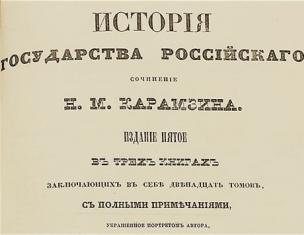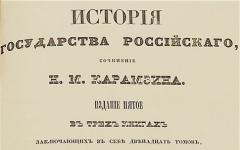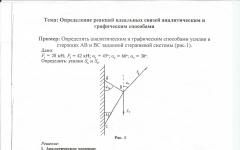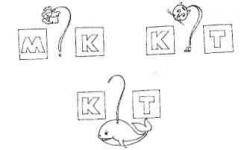Minimum required scores. Converting points to a five-point system.
Parents and students often ask the question: how many points in a subject must be scored for the subject to be considered passed? Here is a letter from Rosobrnadzor on the conditions passing the OGE and transferring it to a five-point system. Unified State Examination points.
● Minimum number of points in subjects:
Letter of Rosobrnadzor No. 10220 dated 04/03/2018 by definition minimum quantity points of the main state exam and recommendations for transferring the amount of primary exam scores OGE work into a five-point rating system.
Recommendations for determining the minimum number of points in the main state exam (OGE), confirming that students have mastered educational programs of basic general education in 2018.
Recommendations for transferring the amount of primary points for
examination papers of the main state exam (OGE) in a five-point grading system
1. RUSSIAN LANGUAGE
The maximum number of points that a participant in the OGE can receive for completing the entire examination work is 39 points.
2. MATHEMATICS
The maximum number of points that an OGE participant can receive for completing the entire examination work is 32 points. Of these, for completing assignments in the Algebra module - 20 points, and in the Geometry module - 12 points.
The recommended minimum result for completing the examination work is 8 points, scored in total for completing tasks in both modules, provided that at least 2 points of these were obtained in the Geometry module.
* Exam results can be used when admitting students to specialized classes for training on educational programs secondary general education.
The guideline for selection into specialized classes can be indicators whose lower limits correspond to the following primary scores:
- for a natural science profile: 18 points, of which at least 6 in geometry;
- for the economic profile: 18 points, of which at least 5 in geometry;
- for the physics and mathematics profile: 19 points, of which at least 7 in geometry.
3. PHYSICS
The maximum number of points that an OGE participant can receive for completing the entire examination work is 40 points.
Scale for converting the total primary score for completing the examination work into a mark on a five-point scale:
* The exam results can be used when admitting students to specialized classes for training in educational programs of secondary general education. A guideline for selection into specialized classes can be an indicator whose lower limit corresponds to 30 points.
4. CHEMISTRY
The maximum number of points that a participant in the OGE in chemistry can receive for completing the entire examination work (without a real experiment) is 34 points.
Scale for converting the total primary score for completing the examination work into a mark on a five-point scale (work without a real experiment, demo version 1):
* The exam results can be used when admitting students to specialized classes for training in educational programs of secondary general education. The guideline for selection into specialized classes can be an indicator whose lower limit corresponds to 23 points.
The maximum number of points that a participant in the OGE in chemistry can receive for completing the entire examination work (with a real experiment) is 38 points.
Scale for converting the primary score for completing an examination paper into a mark on a five-point scale (working with a real experiment, demo version 2):
* The exam results can be used when admitting students to specialized classes for training in educational programs of secondary general education. A guideline for selection into specialized classes can be an indicator whose lower limit corresponds to 25 points.
Continued on second page.
After checking the Unified State Exam tasks in the Russian language, a primary score is assigned for their completion: from 0 to 57. Each task is assessed with a certain number of points: than more difficult task, the more points you can get for it. For correct completion of tasks in the Unified State Examination in the Russian language, 1 to 5 points are given depending on the complexity of the task. In this case, you can get from 0 to 24 points for the essay.
After this, the primary score is converted into a test score, which is indicated in the Unified State Examination certificate. This score is used for admission to higher education institutions. Transfer of Unified State Examination points carried out using a special point scale.
Also, based on the Unified State Exam score, you can determine the approximate grade on a five-point scale that a student would receive for completing tasks in the Russian language in the exam.
Below is scale for converting Unified State Exam scores in the Russian language: raw scores, test scores and rough score.
Unified State Exam score conversion scale: Russian language
The minimum test score for admission to higher education institutions in the Russian language is 36.
| Primary score | Test score | Grade |
|---|---|---|
| 0 | 0 | 2 |
| 1 | 3 | |
| 2 | 5 | |
| 3 | 8 | |
| 4 | 10 | |
| 5 | 12 | |
| 6 | 15 | |
| 7 | 17 | |
| 8 | 20 | |
| 9 | 22 | |
| 10 | 24 | 3 |
| 11 | 26 | |
| 12 | 28 | |
| 13 | 30 | |
| 14 | 32 | |
| 15 | 34 | |
| 16 | 36 | |
| 17 | 38 | |
| 18 | 39 | |
| 19 | 40 | |
| 20 | 41 | |
| 21 | 43 | |
| 22 | 44 | |
| 23 | 45 | |
| 24 | 46 | |
| 25 | 48 | |
| 26 | 49 | |
| 27 | 50 | |
| 28 | 51 | |
| 29 | 53 | |
| 30 | 54 | |
| 31 | 55 | |
| 32 | 56 | |
| 33 | 57 | 4 |
| 34 | 59 | |
| 35 | 60 | |
| 36 | 61 | |
| 37 | 62 | |
| 38 | 64 | |
| 39 | 65 | |
| 40 | 66 | |
| 41 | 67 | |
| 42 | 69 | |
| 43 | 70 | |
| 44 | 71 | |
| 45 | 72 | 5 |
| 46 | 73 | |
| 47 | 76 | |
| 48 | 78 | |
| 49 | 81 | |
| 50 | 83 | |
| 51 | 86 | |
| 52 | 88 | |
| 53 | 91 | |
| 54 | 93 | |
| 55 | 96 | |
| 56 | 98 | |
| 57 | 100 |
The page contains Unified State Exam results in all subjects for past years - from 2010 to the present. The tables show the average score for each subject, the number of 100-point students, the percentage of those who did not pass the exam (who did not pass the threshold established for the subject), and the total number of those who passed the exam.
The material was prepared based on official releases of Rosobrnadzor.
Unified State Exam 2019 results
| Item | Average score | High-score (81-100) | 100-point marks | Didn't pass the Unified State Exam 2019, % | Number of people who took the exam |
| Russian language | 69,5 | 23,5 | 2 590 | 0.6% (threshold 24 points) | 664 000 |
| Mathematics profile | 56,5 | 7,1 | 6.7% (threshold 27 points) | 362 600 | |
| Mathematics base | 4,1 | - | - | (threshold 3 points) | 312 000 |
| Social science | 54,9 | 7,8 | (threshold 42 points) | 315 200 | |
| Physics | 54,4 | 8,6 | (threshold 36 points) | 139 500 | |
| Story | 55,3 | 9,4 | 6.9 (threshold 32 points) | 103 300 | |
| Biology | 52,2 | 5,6 | (threshold 36 points) | 123 800 | |
| Chemistry | 56,7 | 11,5 | 14.4 (threshold 36 points) | 89 000 | |
| English language | 73,8 | 42,7 | (threshold 22 points) | 74 300 | |
| Computer Science and ICT | 62,4 | 21,7 | (threshold 40 points) | 74 900 | |
| Literature | 63,4 | 15,9 | 4% (threshold 32 points) | 44 200 | |
| Geography | 57,2 | 7,4 | 6% (threshold 37 points) | 16 600 | |
| German | 72,4 | 42,1 | (threshold 22 points) | 1 250 | |
| French | 73,1 | 39,3 | (threshold 22 points) | 800 | |
| Spanish | 72,2 | 45,5 | (threshold 22 points) | 132 | |
| Chinese | 62,5 | 29,2 | 1 | (threshold 22 points) | 75 |
| Total: | 302 000 | 6 729 | 6,4% | 750 000 |
Almost 750 thousand people are registered to participate in the main period of the Unified State Exam 2019, of which 662 thousand are graduates of the current year. During the main period of the Unified State Examination, 5,713 examination points (PPE) were used, with about 51 thousand classrooms. All PES have used the technology of printing examination materials in classrooms; in 8 regions, for the first time this year, the technology of transmitting examination materials to PES via the Internet has been used.
- Since 2019, graduates have the right to choose only one Unified State Exam level in mathematics (basic or specialized), but when retaking this level can be changed.
- Since 2019, graduates of previous years are not entitled to participate in the Unified State Examination in basic level mathematics.
- The popularity of natural science subjects has increased. Thus, in 2019, the increase in the number of USE participants in biology was 25 thousand compared to last year, in chemistry - about 16 thousand, in physics - about 13 thousand participants. Also, compared to 2018, the level of interest in computer science and ICT has increased noticeably (an increase in the number of participants by 27 thousand people), English (an increase by 18 thousand people) and history (an increase by 15 thousand).
- In 2019, I passed the Unified State Examination for the first time Chinese language, 289 people applied to participate. Only 75 people passed the exam within the main deadline. Muscovite Anastasia Andryunina is the only one who passed the Unified State Exam in Chinese with 100 points, and is going to enter the RUDN University.
- A resident of Seversk named Putin scored 300 points on the Unified State Exam. Graduate Alexander Putin passed the maximum score Russian language, mathematics and physics.
- Two participants in the Unified State Exam 2019 were able to score 400 points based on the results of four exams. 30 participants became 300 points. 445 people recruited 200 points on two Unified State Examinations.
- 812 people were removed from the exam for various violations, including for having mobile phones (355 removed) and cheat sheets (323 removed)
- Unified State Examination foreign language it is planned to be introduced as a compulsory subject in 2022. This will be preceded by the necessary preparatory work, testing, discussion of how best to differentiate the exam by level of difficulty.
- From 2020 there may be an opportunity passing the Unified State Exam in computer science.
Unified State Exam 2018 results
| Item | Average score | High-score (81-100) | 100-point marks | Didn't pass the Unified State Exam 2018, % | Number of people who took the exam |
| Russian language | 70,93 | 26,7% | 3722 (0,6%) | 0.4% (threshold 24 points) | 645 500 |
| Mathematics profile | 49,8 | 145 (0,03%) | 7% (threshold 27 points) | 421 000 (61%) | |
| Mathematics base | 4,29 | - | - | 3.1% (threshold 3) | 567 000 |
| Social science | 55,7 | 16.43% (threshold 42 points) | 368 000 (53%) | ||
| Physics | 53,2 | (threshold 36 points) | 171 500 (25%) | ||
| Story | 55,1 | 7,4 | 206 (0,002%) | 9.6% (threshold 32 points) | 112 000 (20%) |
| Biology | 51,7 | 45 (0,03%) | 17.01% (threshold 36 points) | 140 000 (21%) | |
| Chemistry | 55,1 | 634 (0,75%) | 15.88% (threshold 36 points) | 84 500 (14%) | |
| English language | 69,2 | 15 (0,02%) | (threshold 22 points) | 83 500 | |
| Computer Science and ICT | 58,4 | 13% | 254 (0,4%) | 11.51% (threshold 40 points) | 67 000 |
| Literature | 62,7 | 599 (1%) | (threshold 32 points) | 42 500 | |
| Geography | 56,6 | 64 (0,4%) | 7.3% (threshold 37 points) | 16 000 | |
| German | 68,9 | 3 (0,2%) | (threshold 22 points) | 1 758 | |
| French | 77,3 | 2 (0,2%) | (threshold 22 points) | 948 | |
| Spanish | 79,1 | (threshold 22 points) | 153 | ||
| Total: | 6 136 | 4,8% | 731 000 |
731,000 people took the exams in 2018 (in the main period - 670,000), including 645,000 graduates of the current year.
- Graduates who did not achieve the minimum threshold points for mandatory Unified State Examination (basic mathematics and Russian), can retake the exam in the same year on a reserve day. If it doesn’t work out again, then in September.
- If USE participants are found to have mobile communications devices or cheat sheets, they will be removed from the exam without the right to retake the current year.
- Elective subjects can only be retaken the next year. In 2018, 478 people were removed from the exam for phones, and 463 for cheat sheets. “This year there were several guys who used earphones, and the camera was not on the phone, but on their clothes. All these graduates were removed from the exams without the right to retake "- said the head of the quality assessment department general education Rosobrnadzor Igor Kruglinsky.
- When applying to a university, you can use any result that has not expired.
- The results of the Unified State Exam do not affect the mark on the certificate.
- A notable event of the Unified State Exam 2018 was the fact of which Rosobrnadzor did not recognize.
- The number of 100-pointers increased by 1000 compared to last year.
- One participant from Moscow passed four subjects with 100 points.
- 1.9% (12,252 people) did not receive a certificate based on the results of the Unified State Exam.
Unified State Exam 2017 results
| Item | Average score | Number of 100-point marks | Didn't pass the Unified State Exam 2017, % | Number of people who gave | |
| Russian language | 69,1 | 25,04% | 3 099 | 0.5% (threshold 24 points) | 617 000 |
| Mathematics profile | 47,1 | 4,51% | 224 | 14.34% (threshold 27 points) | 391 981 |
| Mathematics base | 4,24 | - | - | 3.4% (threshold 3 points) | 453 000 |
| Social science | 55,4 | 4,46% | 142 | 13.8% (threshold 42 points) | 318 000 |
| Physics | 53,2 | 4,94% | 278 | 3.78% (threshold 36 points) | 155 281 (24%) |
| Story | 52,7 | 8.7% (threshold 32 points) | 110 000 | ||
| Biology | 52,6 | 6,54% | 75 | 18% (threshold 36 points) | 111 748 |
| Chemistry | 55,2 | 15% (threshold 36 points) | 74 000 | ||
| English language | 70,2 | 59 | (threshold 22 points) | 64 422 | |
| Computer Science and ICT | 59,2 | 9.3% (threshold 40 points) | 53 000 | ||
| Literature | 59,6 | 343 | 2.9% (threshold 32 points) | 41 267 | |
| Geography | 55,1 | 8,6% | 9.3% (threshold 37 points) | 14 000 | |
| German | 63,8 | 24,56% | 0 | 3.36% (threshold 22 points) | 1 769 |
| French | 75,9 | 50,81% | 0 | 0.43% (threshold 22 points) | 1 123 |
| Spanish | 68,4 | 38,04% | 0 | 6.75% (threshold 22 points) | 231 |
| Total: | 5 026 | 703 000 |
About 703 thousand people took part in the exams, of which about 617 thousand people were graduates of the current year.
- Those who did not achieve the minimum score in one compulsory subject were allowed retake the exam on a reserve day. 12 thousand people went to retake basic level mathematics during the reserve period. Mathematics profile level On the reserve day, 2 thousand graduates retook the test.
- There are quite a lot in the regions 100-point students in Russian language. For example, in the Vologda region there are 27 such people, in the Krasnoyarsk Territory - 61, in Chelyabinsk region- 76, in Novosibirsk - 89.
- 21 people managed to recruit 300 points for the Unified State Exam in 2017. This means that they received 100 points on three Unified State Examinations.
- The number of attempts to cheat or smuggle a phone into an exam in 2017 decreased by an average of 25 percent. In one of the regions, a school principal was fired for trying to help students take an exam. In another, a teacher was fired for coming to the Unified State Examination with a mobile phone.
- The total number of violations this year has decreased by more than one and a half times compared to the previous year.
- In 2017, as in 2016, the most popular elective subjects were social studies (chosen by 54% of Unified State Exam participants), physics (26%), history (21%), biology (20%), and chemistry (13%).
- 2.6% (15,878 people) did not receive a certificate based on the results of the Unified State Exam.
Unified State Exam 2016 results
| Item | Average score | Number of high-scorers (81-100) | Number of 100-point marks | Didn't pass the Unified State Exam 2016, % | Number of people who gave |
| Russian language | 68 | 25,58% | 3433 | 1% | 658 000 |
| Mathematics profile | 46,2 | 2,69% | 296 | 15,33% | 439 229 |
| Mathematics base | 4,15 | - | - | 4.6% (threshold 3 points) | 453 000 |
| Social science | 53,1 | 3,11% | 59 | 17.6% (threshold 42 points) | 382 000 |
| Physics | 50,0 | 6.11% (threshold 36 points) | 180 000 | ||
| Story | 16% (threshold 32 points) | ||||
| Biology | 52 | 7,16% | 61 | 18.6% (threshold 36 points) | 126 006 |
| Chemistry | 84 000 | ||||
| English language | 69,78 | 27 | 64 050 | ||
| Computer science | 56,6 | 12.4% (threshold 40 points) | |||
| Literature | 57,91 | 256 | 4.3% (threshold 32 points) | 43 585 | |
| Geography | 13% (threshold 37 points) | ||||
| German | 66,76 | 32,77% | 1 | 3,29% | 1 980 |
| French | 73,62 | 42,31% | 6 | 1,25% | 1 273 |
| Spanish | 74,59 | 49,65% | 2 | 2,8% | 204 |
300 points on three Unified State Examinations in 2016, only three students were recruited in all of Russia. Mikhail Chekanov from Olenegorsk, Murmansk region, passed the most high score physics, specialized mathematics and computer science. A graduate from Kemerovo, Elizaveta Shabanova, received 100 points on the Unified State Exam in Russian language, history, and social studies. In Kirov, a graduate of the famous physics and mathematics lyceum, Alexander Artemyev, passed physics, computer science and mathematics with 100 points and entered the Physics and Technology Institute.
- Quantity deletions There were about a thousand graduates from the Unified State Examination in 2016, while schoolchildren began to use paper cheat sheets more often.
- 1.9% (12,308 people) did not receive a certificate based on the results of the Unified State Exam.
Unified State Exam 2015 results
| Item | Average score | Number of high-scorers (81-100) | Number of 100-point marks | Didn't pass the Unified State Exam 2015, % | Number of people who gave |
| Russian language | 65,8 | 19,8% | 3036 | 1,5% | |
| Mathematics profile | 45,6 | 521 151 | |||
| Mathematics base | 3,95 | - | - | 7,4% | |
| Social science | 58,6 | 371 200 | |||
| Physics | 51,4 | 159 500 | |||
| Story | 47,1 | 145 000 | |||
| Biology | 53,6 | 122 936 | |||
| Chemistry | 57,1 | ||||
| English language | 64,9 | 61 946 | |||
| Computer Science and ICT | 54 | ||||
| Literature | 57,1 | 5.3% (threshold 32 points) | 37 512 | ||
| Geography | 53 | ||||
| German | |||||
| French | |||||
| Spanish |
In total, 725 thousand people took part in the Unified State Examination, of which 650 thousand people were graduates of the current year. The total number of students in all subjects in 2015 is 3,922 people.
In 2015, the mathematics exam was held for the first time at two levels - specialized and basic. The exam participant had the right to independently choose either of the levels, or both levels, depending on his educational needs, as well as the prospects for continuing his education.
- 4.8% (31,343 people) did not receive a certificate based on the results of the Unified State Exam.

Unified State Exam 2014 results
| Item | Average score | Number of 100-point marks | Didn't pass the Unified State Exam 2014, % | Number of people who gave |
| Russian language | 62,5 | 2385 | 4% | |
| Mathematics | 46,4 | |||
| Social science | 53,1 | |||
| Physics | 45,7 | 16,7% | ||
| Story | 46,4 | 20,4% | ||
| Biology | 54,8 | |||
| Chemistry | 55,7 | 13,4% | ||
| English language | 61,3 | |||
| Computer Science and ICT | 57,2 | 11,5% | ||
| Literature | 54,1 | |||
| Geography | 53,1 | 15,5% | ||
| German | ||||
| French | ||||
| Spanish |
In total, 733,368 people took part in the Unified State Examination, of which 684,574 people were graduates of the current year. The total number of students in all subjects in 2014 was 3,705 people.
- The number of those who failed compulsory subjects (Russian language and mathematics) in 2014 decreased by 24% compared to 2013.
- The number of 100-point students has decreased three times.
- This year the minimum score for compulsory subjects has been lowered. If this had not happened, 28,000 students would not have received their diplomas.
Unified State Exam 2013 results
| Item | Average score | Number of 100-point marks | Didn't pass the Unified State Exam 2013, % | Number of people who gave |
| Russian language | 63,9 | 2531 | 1,9 | 834020 |
| Mathematics | 48,7 | 538 | 6,2 | 803741 |
| Social science | 59,5 | 84 | 481990 | |
| Physics | 53,5 | 474 | 11,0 | 208875 |
| Story | 54,8 | 500 | 11,0 | 164219 |
| Biology | 58,6 | 466 | 7,1 | 162248 |
| Chemistry | 67,8 | 3220 | 7,3 | 93802 |
| English language | 72,4 | 581 | 3,3 | 74668 |
| Computer science | 63,1 | 563 | 8,6 | 58851 |
| Literature | 457 | 5,6 | 44420 | |
| Geography | 57,2 | 193 | 12,1 | 20736 |
| German | 58,6 | 4 | 3,2 | 2768 |
| French | 69,5 | 5 | 0,5 | 1561 |
| Spanish | 68,9 | 0 | 1,7 | 233 |
Unified State Exam 2012 results
| Item | Average score | Number of 100-point marks | Didn't pass the Unified State Exam 2012, % | Number of people who gave |
| Russian language | 61,5 | 1923 | 2.2% (threshold 36 points) | 827529 |
| Mathematics | 45,2 | 54 | 5.5% (threshold 24 points) | 803913 |
| Social science | 55,5 | 84 |
5.8% (threshold 39 points) |
455942 |
| Physics | 47,3 | 44 | 13.5% (threshold 36 points) | 205988 |
| Story | 52,1 | 219 | 12.4% (threshold 32 points) | 153502 |
| Biology | 54,3 | 46 | 8.1% (threshold 36 points) | 159448 |
| Chemistry | 57,8 | 370 | 10.8% (threshold 36 points) | 89529 |
| English language | 61,2 | 28 | 3.3% (threshold 20 points) | 71825 |
| Computer science | 60,7 | 364 | 11.6: (threshold 40 points) | 59646 |
| Literature | 337 | 4.9% (threshold 32 points) | 42102 | |
| Geography | 56,1 | 66 | 8.4% (threshold 37 points) | 23523 |
| German | 58,0 | 1 | 3,2 | 2970 |
| French | 67,1 | 0 | 0,7 | 1621 |
| Spanish | 70,4 | 1 | 0,8 | 265 |
Unified State Exam 2011 results
| Item | Average score | Number of 100-point marks | Didn't pass the Unified State Exam 2011, % | Number of people who gave |
| Russian language | 60,02 | 1437 | 4,1 | 760618 |
| Mathematics | 47,49 | 205 | 4,9 | 738746 |
| Social science | 57,11 | 23 | 3,9 | 280254 |
| Physics | 51,54 | 206 | 7,4 | 173574 |
| Story | 51,2 | 208 | 9,4 | 129354 |
| Biology | 54,29 | 53 | 7,8 | 144045 |
| Chemistry | 57,75 | 331 | 8,6 | 77806 |
| English language | 61,19 | 11 | 3,1 | 60651 |
| Computer science | 59,74 | 31 | 9,8 | 51180 |
| Literature | 57,15 | 355 | 5 | 39317 |
| Geography | 54,4 | 25 | 8 | 10946 |
| German | 48,99 | 2 | 6,6 | 2746 |
| French | 62,97 | 0 | 1,2 | 1317 |
| Spanish | 70,09 | 0 | 1,4 | 143 |
The number of students who took the Unified State Exam compared to 2010, the number of graduates who took the Unified State Exam in 2011 decreased from 850 thousand to 720 thousand (by 15%).
Unified State Exam 2010 results
The table contains the results of passing the Unified State Exam in 2010 throughout Russia.
| Item | Number of participants | Didn't pass the Unified State Exam 2010, % | Number of 100 points | Number of applicants who did not proceed to Part C, % |
| Russian language | 901929 | 3,7 | 1415 | 5,4 |
| Mathematics | 854708 | 6,1 | 160 | 38,81 |
| Social science | 444219 | 3,9 | 34 | 3,01 |
| Physics | 213186 | 5 | 114 | 32,32 |
| Story | 180900 | 9 | 222 | 12,08 |
| Biology | 171257 | 6,1 | 133 | 8,51 |
| Chemistry | 83544 | 6,2 | 275 | 11,27 |
| English language | 73853 | 5 | 2 | 5,51 |
| Computer science | 62652 | 7,2 | 90 | 22,33 |
| Literature | 54313 | 5 | 422 | 1,69 |
| Geography | 22256 | 6,3 | 17 | 14,06 |
| German | 4177 | 12 | 0 | 10,06 |
| French | 1883 | 1 | 0 | 4,99 |
The total number of graduates in 2010 was 836,565. This figure is slightly lower than the total number of those who took the Unified State Exam, due to retakes of graduates from previous years.
0 10 149

Passing scores at universities depend on the level of graduates and are recalculated annually. For example, this is how the scores at Moscow State University changed for applicants to law: 331 in 2014, 359 in 2015, 356 in 2016, 347 in 2017. The university will publish passing scores for 2018 when graduates submit their documents.
Passing scores at universities depend on the level of graduates and are recalculated annually. For example, this is how the scores at Moscow State University changed for applicants to law: 331 in 2014, 359 in 2015, 356 in 2016, 347 in 2017. The university will publish passing scores for 2018 when graduates submit their documents.
The university may set minimum passing scores for each subject. For example, those entering the Moscow State Medical University named after I.M. Sechenov in the field of general medicine must have at least 54 points in chemistry, biology and the Russian language. Minimum scores, if any, are indicated in the admission rules on the website of any university. You will find them in the section about the 2018 admissions campaign.
Do not confuse the minimum passing scores and the average Unified State Examination score. The average score is calculated based on the results of applicants who entered the university: the total passing score is divided by the number of exams - usually three. For example, the passing score for the “Economics” course is 251: 251/3 = 83.6. We round and get 84 - this will be the average score.
Here are the averages Unified State Examination points for those entering Moscow universities for full-time budgetary studies:
According to the Do the Right Thing app
| MIPT | MEPhI | MSTU im. Bauman | MGIMO | RANEPA | Financial University | MIET | MPGU | Moscow State University | Moscow State Law Academy |
| 91 | 87 | 77 | 87 | 70 | 74 | 70 | 70 | 81 | 76 |
| RSUH | RUDN University | RNIMU named after. Pirogov | REU im. Plekhanov | MIREA | STANKIN | National Research University Higher School of Economics | MISiS | MPEI | MSLU |
| 71 | 65 | 79 | 72 | 65 | 66 | 83 | 77 | 69 | 80 |
Usually, only USE results are needed for admission, but some universities conduct DVI - additional entrance tests. For example, Moscow State University and St. Petersburg State University can conduct further studies in undergraduate and specialist programs.
Additional creative or professional tests are held at many universities in the areas of “architecture”, “pediatrics”, “journalism”, “ Teacher Education», « Physical Culture", "TV". Full list For directions, see the order of the Ministry of Education and Science. DVI is usually assessed on a 100-point scale, so the passing score in some universities is more than 300 or 400 - depending on the number of exams.
Why look at passing scores from previous years?
It is useful to look at the 2017 passing scores to assess your chances. The graduation rate varies every year, but not always significantly. On the university website, passing scores from previous years are listed in the section for applicants.
To prepare tables with passing scores, we have selected several popular areas of preparation. The Ministry of Education and Science reported that in 2017 these were economic programs - 21 people. / place, specialties in the field of politics and international relations- 20 people /place, media - 19 people. / place, medicine - 8–16 people. / place, engineering and technical areas - 7 people. / place.
The tables indicate the passing scores for the full-time budget department of Moscow universities. If the passing score is above 300, it means that the university has additional exams in this area.
Technical specialties
| MIPT | MEPhI | MSTU im. Bauman | STANKIN | MPEI | MIREA | National Research University Higher School of Economics | |
| Computer science and computing technique |
287 | 271 | 266–286 | 201 | 216 | 220 | 257 |
| Computer or informational safety |
282 | 270 | 270–284 | No preparation | 248 | 232–242 | 293 |
| Mechanical engineering | No preparation | No preparation | 219–227 | 174 | 184 | 186 | No preparation |
Humanities
| Moscow State University | MGIMO | National Research University Higher School of Economics | REU im. Plekhanov | Financial University | RANEPA | RUDN University | MSLU | |
| Economy | 331 | 341 | 358 | 344 | 252–267 | 231–252 | 251 | No preparation |
| Management | No "budget" | No "budget" | 361–364 | 347 | 246–252 | 257–274 | 247 | No preparation |
| State and municipal administration | 324 | 274 | 349 | 257 | 249 | 247 | 250 | No preparation |
| International relationships | 389 | 352 | 396 | No preparation | 267 | 283 | 292 | 279 |
| Jurisprudence | 347 | 353 | 373 | 279 | 261 | 263 | 285 | 276 |
| Linguistics | 366 | No preparation | 287 | 295 | No preparation | No preparation | 290 | 252 |
| Journalism | 346 | 397 | 365 | No preparation | No preparation | 275–278 | 328 | 350 |
Medicine
Every graduate who wants to become a student at one of the Russian universities in 2018 faces a difficult task - to successfully pass the Unified State Exam, as well as to choose the right educational institution and faculty for submitting documents. Most 11th graders and their parents are faced with the final exam grading system for the first time and often find it difficult to find answers to the questions that arise. Therefore, we decided to shed light on important points.
In 2017-2018, the basic rules for passing the Unified State Exam will not be significantly changed. This means that the 100-point assessment system for final tests will still be relevant for graduates.
How is everything going?
During the inspection exam papers For each correctly completed task, the graduate receives so-called “primary points”, which upon completion of the work check are summed up and converted into a “test score”, which is indicated in the Unified State Examination certificate.
Important! Since 2009, the scale for converting primary and test scores of the Unified State Examination into traditional five-point grades for schools has not been officially used, because in 2017 and 2018 the final exams are not included in the certificate.
Work verification is performed in two ways:
- automatically (using special programs and technical means);
- manually (the correctness of detailed answers is checked by two independent experts).
It is quite difficult to challenge the result of an automatic check. If the basic rules were not followed when filling out the answer table, the computer may not protect the result, and the only person to blame for this will be the graduate himself, who has not followed a number of mandatory rules.

If controversial issues arise during the expert review, a third specialist is involved, whose opinion will be decisive.
When can I expect results?
The following time frames apply by law:
- data processing (for compulsory subjects) in the RCIO should not last longer than 6 calendar days;
- RCIO is given 4 days for data processing (elective subjects);
- verification at the Federal Testing Center should take no more than 5 working days;
- approval of results by the State Examination Commission - 1 more day;
- up to 3 days for distribution of results to Unified State Exam participants.
In practice, from the moment of passing the exam to receiving the official result, it can take from 8 to 14 days.
Converting Unified State Examination points into grades
Despite the fact that officially in 2018 the scale for transferring points according to Unified State Exam subjects is not used in the five-point assessment; many still want to interpret their result in a more familiar “school” system. To do this, you can use special tables or online calculators.
Table for converting OGE test scores into grades
Russian language | ||||
Mathematics | ||||
Computer science | ||||
Social science | ||||
Foreign languages | ||||
Biology | ||||
Geography | ||||
Literature | ||||
The second method is a little simpler and more convenient than searching required values in the cells of a huge table. You just need to choose a subject (mathematics, Russian language, chemistry, physics, history, English language, social studies... and other subjects), enter data and get the desired result in a matter of seconds.
We invite you to try how simple and convenient it is to use online calculators for the Unified State Exam score and its conversion into a 5-point score in practice.
Transferring points from primary to test
Converting Unified State Examination points into grades
Internet systems for applicants
The 2017-2018 academic year has been completed, the exam has been passed, the results are known, and even the interactive scale for converting primary scores showed that Unified State Exam result located in a fairly good range... But is this enough to enter the desired university?
Assess the real chances of admission based on test scores and the minimum passing threshold set by the university.
Important! The minimum passing score is determined by the university itself. It will directly depend on the scores of applicants who apply in 2018. The more popular the specialty, the higher the passing score.
Often at TOP faculties, even 100-point results are not enough for admission to the budget. Only Olympiad winners who receive significant additional points have a chance to see their name on the list of applicants for such majors.

In 2018, the most popular services for selecting a university and monitoring the entrance score threshold for various specialties will be:
- Ucheba.ru
- Apply online
- Calculator High school economy
- Postyplenie.ru
- Typical applicant
These services are very easy to find. Just enter their name into any search engine.








